English Words in Action, Group R
(a variety of English words which have developed through history and are currently used in our modern age)
Simply click on this banner (or the following link) and you will be on your way to stimulate your brain for greater word comprehension with quizzes based on some of the words in this unit.
1. A person or people who go on long walks; especially, for pleasure: Adam has been a rambler for many years and he is convinced that it has been good for his physical and mental well-being.
Philip and Phyllis are ramblers who enjoy going for walks each evening, weather permitting.
2. A kind of plant; such as, a rose bush or vines that grow up and over walls, fences, etc.: The vine ramblers can be seen growing up on the walls of Kevin's house.
Written or spoken words that go from one topic to another one without any apparent organization: The visiting speaker may have had a stroke because his ramblings were not normal for him.
rambling (adjective), more rambling, most rambling
1. A reference to a large building that has a great number of rooms: The people were amazed when they saw the old rambling building out on the farm.
2. Without a specific purpose, direction, or objective: The family decided to go on a rambling vacation across the country instead of planning any specific places to visit.
2. Without a specific purpose, direction, or objective: The family decided to go on a rambling vacation across the country instead of planning any specific places to visit.
The weatherman presented a rambling lecture about the extreme weather conditions that were taking place during the summer.
An outburst of violence or riotous behavior by a person, or people, who destroy property: The rioters went on a rampage, breaking into stores and stealing things or setting them on fire.
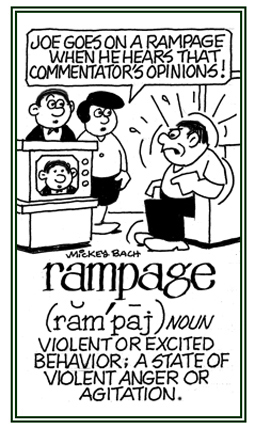
© ALL rights are reserved.
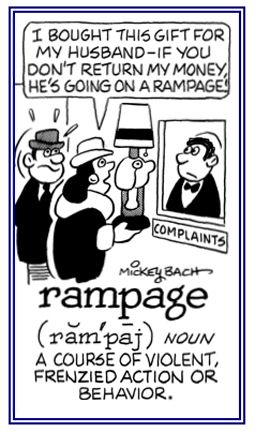
© ALL rights are reserved.
Go to this Word A Day Revisited Index


Go to this Word A Day Revisited Index
so you can see more of Mickey Bach's cartoons.
rampage (verb), rampages; rampaged; rampaging
1. To be involved in a violent or riotous behavior, or to do a series of violent acts: The fans of the losing team rampaged in the streets for some time with wild and uncontrollable rock throwing and destruction of property in the area near the sports field.
2. Etymology: probably from a Middle English verb ramp, "rave, rush wildly about" from around 1300, with special reference to "beasts rearing up on their hind legs", as if climbing; from Old French ramper.
2. Etymology: probably from a Middle English verb ramp, "rave, rush wildly about" from around 1300, with special reference to "beasts rearing up on their hind legs", as if climbing; from Old French ramper.
rampageous (adjective), more rampageous, most rampageous
A description of wild and destructive behavior: The shooter in the theater went on a rampageous attack on the people who were there.
rampageously (adverb), more rampageously, most rampageously
Referring to violent and destructive actions: The rioters were rampageously setting fires, attacking shops, other people, and even the police.
A person or individuals who behave in a violent and harmful way: Wayne was accused of being a rampager during the demonstrations against lowering workers' wages and decreasing available jobs.
rampant (adjective), more rampant, most rampant
1. A description of a condition which is spreading quickly and in a way that is difficult to control: There is a concern by local officials about the rampant crime wave that is going on in the city.

© ALL rights are reserved.
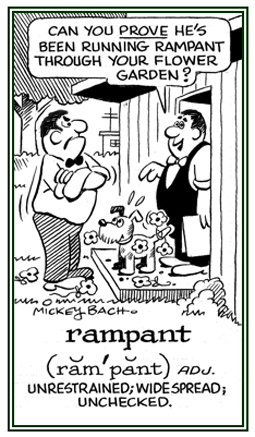
© ALL rights are reserved.
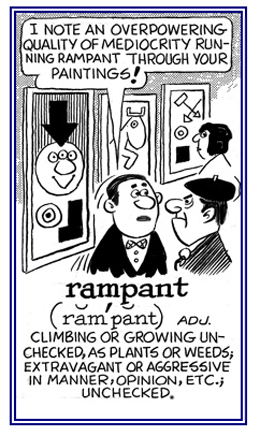
© ALL rights are reserved.
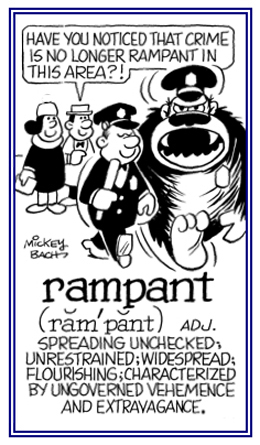
© ALL rights are reserved.
Go to this Word A Day Revisited Index
There have been rampant wildfires which have destroyed many homes in Colorado and California.
2. Etymology: from the French word ramper meaning "to climb, to creep" like an animal on its hind legs using its paws as if it is in a climbing-mode.



Go to this Word A Day Revisited Index
so you can see more of Mickey Bach's cartoons.
1. A resentment, a bitterness, a hostility, or an animosity: At the end of the business meeting about lowering wages, there was some significant rancor among the company's employees.
2. Etymology: from Latin rancere, "to be spoiled" or "to be rotten."

© ALL rights are reserved.
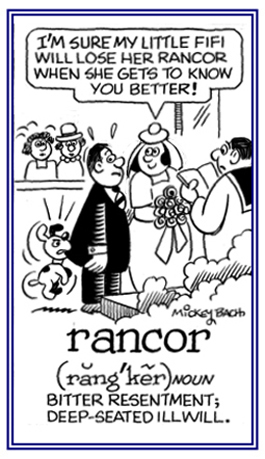
© ALL rights are reserved.
Go to this Word A Day Revisited Index
2. Etymology: from Latin rancere, "to be spoiled" or "to be rotten."


Go to this Word A Day Revisited Index
so you can see more of Mickey Bach's cartoons.
rancorous (adjective), more rancorous, most rancorous
1. A reference to a grudge or grievance which is bitterly malicious, spiteful and hateful: The political leader has made some rancorous sanctions that are causing other countries to plan to get revenge on him and his nation.
2. Etymology: related to Latin rancidus, and rancere, "to be stinking."

© ALL rights are reserved.
Go to this Word A Day Revisited Index
2. Etymology: related to Latin rancidus, and rancere, "to be stinking."

Go to this Word A Day Revisited Index
so you can see more of Mickey Bach's cartoons.
random (adjective), more random, most random
1. Proceeding, made, or occurring without definite aim, reason, or pattern: The program director made random selections of people who could participate in the TV quiz.
2. Characterizing a process of selection in which each item of a set has an equal probability of being chosen: By random choice, the card shark drew an "ace" from the new deck of cards.
3. In building construction: with reference to building materials; lacking uniformity of dimensions; constructed or applied without regularity: The stones in the walk to the house were placed in a random order.
4. Etymology: "having no definite aim or purpose", 1655, from at random (1565), "at great speed" (thus, "carelessly, haphazardly"); alteration of Middle English randon, "impetuosity, speed" (c.1305), from Old French randon, "rush, disorder, force, impetuosity"; from randir, "to run fast", from Frankish rant, "a running".
2. Characterizing a process of selection in which each item of a set has an equal probability of being chosen: By random choice, the card shark drew an "ace" from the new deck of cards.
3. In building construction: with reference to building materials; lacking uniformity of dimensions; constructed or applied without regularity: The stones in the walk to the house were placed in a random order.
4. Etymology: "having no definite aim or purpose", 1655, from at random (1565), "at great speed" (thus, "carelessly, haphazardly"); alteration of Middle English randon, "impetuosity, speed" (c.1305), from Old French randon, "rush, disorder, force, impetuosity"; from randir, "to run fast", from Frankish rant, "a running".
rant (verb), rants; ranted; ranting
1. To talk loudly in a way that shows anger: Greg was told by his wife that he could rant as much as he wanted to, but that it would not change her mind about going to the concert that evening.
2. Etymology: borrowed from Dutch randten, ranten, "to talk foolishly, to rave."

© ALL rights are reserved.
Go to this Word A Day Revisited Index
2. Etymology: borrowed from Dutch randten, ranten, "to talk foolishly, to rave."

Go to this Word A Day Revisited Index
so you can see more of Mickey Bach's cartoons.
1. A bad or dishonest person: The bartender is a rascal who often charges customers more when they are not sober because they usually are not aware of what is going on.
2. A mischievous human or a trickster: That rascal, Ray, is always playing jokes on his brother.
3. Etymology: from Latin rasicare, "to scrape, to scratch"; borrowed from Old French rascaille, from rasque, "mud, filth."
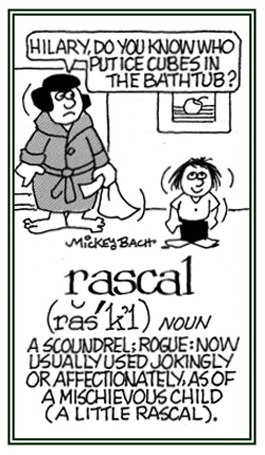
© ALL rights are reserved.
Go to this Word A Day Revisited Index
2. A mischievous human or a trickster: That rascal, Ray, is always playing jokes on his brother.
3. Etymology: from Latin rasicare, "to scrape, to scratch"; borrowed from Old French rascaille, from rasque, "mud, filth."

Go to this Word A Day Revisited Index
so you can see more of Mickey Bach's cartoons.
rebuff (verb), rebuffs; rebuffed; rebuffing
1. To suddenly hinder someone from making advances, offers to help, or to request something, etc. in a rude way: Workers rebuffed the supervisor's plan for building the apartment complex in a different way than was standard practice.
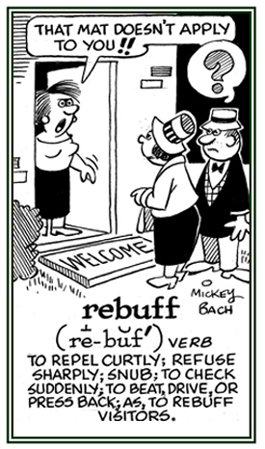
© ALL rights are reserved.
Go to this Word A Day Revisited Index
Karen rebuffed Frank when he asked her for a date.
2. Etymology: from Latin re-, "back" + buffo, "a puff, a snub."
Go to this Word A Day Revisited Index
so you can see more of Mickey Bach's cartoons.
Links to all of the groups of English words in action, Groups A to Z.
You may see the bibliographic list of sources of information for these words in action.


